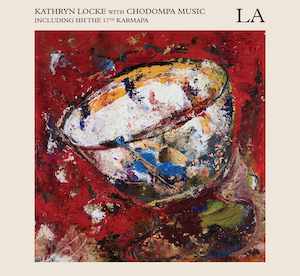
Kathryn Locke with Chodompa Music – LA
Independent – Out Now
Rarely in these days comes a recording that can so instantaneously shout yes. With Kathryn Locke’s ‘LA”, that joy is instantaneous from the first few bars, maintaining that momentum effortlessly over ten primarily instrumental tracks. Forget any need to prudently toddle off to Spotify, take my word for it and get this album.
Let’s backtrack a bit and set some context. You may recall the name of Kathryn Locke, especially if you were a fan of brass-heavy country dance unit, Scarp, Paul James’ many-headed ceilidh big band, with whom Kathryn was the cellist. She was also a member of other folk bands of the era, this being the early 90’s. She subsequently wrote music for the National Dance Company for Wales, which led to other commissions for dance companies, playing for dance and choreography being her great loves. She has also played with Token Women and electronica duo Lamb, so eclecticism clearly no problem. Tragedy then struck, a neurological condition causing her to lose the power of speech, curtailing her career. Total immersion in meditation, courtesy of the Samye Ling Tibetan Centre, in Dumfries, was a key driver in her recovery. Whilst she never stopped playing, public performance was out of the question until the Centre started putting on Saturday night musical sessions. As health and confidence built upon each other, the desire to become a performer again was reborn in her. A chance meeting with the flautist Sarah Allen (Flook), herself with a track record of being a performer for contemporary dance, led to a request they work together. Enlisting then the skills of mandola player, Geoff Coombs, who had previously worked alongside Kathryn in Vivando, having an earlier background encompassing free improv and avant-rock, and Chodompa Music were nearly there. With maverick reeds maven, Jo Freya (Blowzabella, Narthen), also in Scarp with Kathryn, and Jo May, orchestral percussionist turned spoons virtuoso, the three of them also all Token Women, they were complete.
So how does one begin to describe this music? Again, some context helps. Insistent of each instrumentalist finding their own voice, each piece germinating from a seed of cello improvisation, the different tones and textures meld and mesh into a composite of meticulous ensemble playing. The cello is undeniably the backbone, but the flutes and reeds are often the limbs that point the way. A first thought may be of Indian influences, the cadences of melody similar thereto, but Tibetan would be the closest comparison, not least by virtue of Locke’s rehabilitation.
‘Dancing in the Ancient Dirt’ opens proceedings with pizzicato cello and plucked mandola, ahead of the flute weaving a sinuous melody, underset with percussion, before the cello swoops in, an exotic dance that is picked then up by the flute and the entry of Freya’s soprano sax, in unison. It sounds trite, but I can’t help thinking of Kaa, the python, as he first appears in Disney’s 1967 ‘Jungle Book’, but Frank Zappa arranged the music in Little Umbrellas (Hot Rats) mode. My smile is as immense as it was back then, in the cinema.
‘The Price’ is more reflective and pastoral, an air that conjures more a field of corn, swaying in the wind, gradually building ahead of a middle eight that veers the tune into a different direction, haunting piccolo bleeding off before the ensemble brings it all back together. Utterly beautiful, setting the scene then for another lively rhythmical romp which, unsurprisingly, carries echoes of a gavotte or some such, via the playing of Scarp and Blowzabella, but with a greater reliance on cello, which saws away succinctly and surprisingly, adding textures never obvious. I guess the name, ‘Dervish’, is the giveaway!
Kathryn duets with herself as the mantra-like ‘When the Heart Roars’ starts. And, whilst I may have suggested this an entirely instrumental enterprise, this track provides musical and, in the connecting sections, the meditative opportunity for the chanted words of His Holiness, the 17th Gyalwang Karmapa, Ogyen Trinley Dorge, spiritual leader of the Karma Kagyu, the largest subschool of Kagyu, itself one of the four main Buddhist schools of teaching. That this has a place here reminds us of the importance of Buddhism to Kathryn’s renaissance.
Percussion opens ‘Kilter’, a hypnotic movement, where each instrument takes turns to sashay slowly about the beat and is another thoughtful and beguiling interlude. Next, ‘Firebear’, another nod to the Tibetan blood coursing through this project, is a composition commemorating the 100th birthday of artist Sherab Palden Beru and is solo cello, demonstrative of Kathryn’s unique approach to the instrument.
Back on a more trad footing, ‘Locke’s Lope’ is a near hornpipe, which carouses intricately, the different players adding undercurrents of their own, including the howled ejaculations of, I suspect, Kathryn herself, surely to celebrate her full recovery.
‘A Knowing Touch’ is little more than a pizzicato led palate cleanser of just over a minute, which it does perfectly, to usher in the stately tones of ‘Kuching’, where marimba, sounding like temple bells, provides the main propulsion. Building and elaborating, so enter the other instruments, Freya’s clarinet particularly affecting here. Again an eastern feel jousts with the English classicism of the melody, evocative, even, of Vaughan-Williams.
Closer ‘Hugger Mugger’ is another complex dance tune, almost Gryphonesque, and a lively way to end this intriguing record. As it unwinds, so all the musicians, in turn, take a quick blast, the triad where Coombs mandola intricacy is followed by Freya’s soprano sleight of fingers, itself followed by Locke’s freeform sawing a particular delight. Finally, it fades by way of exit, there being no other way to prevent this lasting perhaps forever.
All in all, this is a strongly recommended set. For music to be the true voice of a performer is almost a cliché. Here it is a fact. Welcome back, Kathryn.
Order LA via: https://kathrynlocke.co.uk/product/la/

